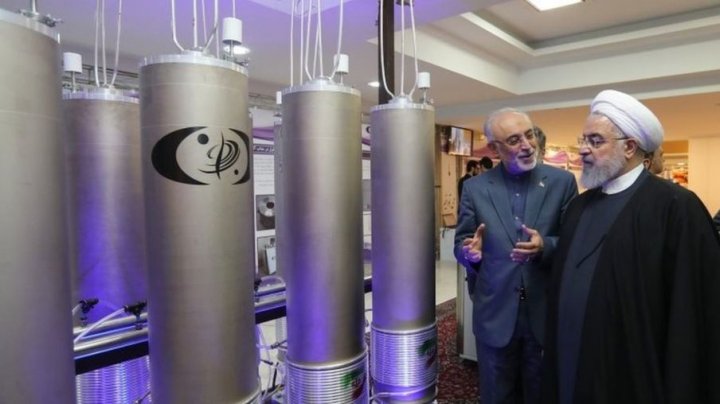Iran suspended commitments under the 2015 international nuclear deal, a year after it was abandoned by the US
 foto: PUBLIKA.MD
foto: PUBLIKA.MD
Iran has suspended commitments under the 2015 international nuclear deal, a year after it was abandoned by the US.
President Hassan Rouhani said he would keep enriched uranium stocks in the country rather than sell them abroad.
He also threatened to resume production of more-highly-enriched uranium in 60 days if other signatories did not act to protect Iran from US sanctions.
The 2015 accord was aimed at curbing Iran's nuclear ambitions in return for relief from sanctions.
But since the US left the deal it has imposed new sanctions, hitting Iran's economy and raising Iran-US tensions.
Iran informed the remaining parties to the deal - France, Germany, Russia, China and the UK - of its decision on Wednesday morning.
Foreign Minister Javad Zarif said Iran was acting within its rights under the deal and it was up to the three European powers to act.Under the deal Iran is required to sell its surplus enriched uranium abroad, rather than keep it.
This is important as the material, which is a by-product of Iran's civilian nuclear power generation, can be used in the manufacture of nuclear weapons.
By selling it abroad, Iran can continue to generate nuclear power and the parties to the agreement can be sure it is not building nuclear weapons.
Iran's announcement comes after US Secretary of State Mike Pompeo made an unscheduled visit to Iraq, and a US aircraft carrier was deployed to the Gulf region.
US officials have reported threats to US forces and their allies from Iran, but have given few details about the exact nature of the threat.
What did President Rouhani say?
Mr Rouhani said he was suspending two parts of the deal, which is known as the Joint Comprehensive Plan of Action (JCPOA), that Iran was adhering to - the sale of surplus enriched uranium and heavy water.
He then gave the European powers, Russia and China 60 days to meet their financial and oil commitments to the deal. If they did so, Iran would resume the sales.
If, however, those commitments were not met and the powers chose to follow US sanctions, he said Iran would begin higher enrichment of uranium, which is currently capped, and begin developing its Arak heavy water reactor based on plans made prior to the deal.
But Iran's president added: "We do not want to leave the agreement. All the people of the world should know that today is not the end of the JCPOA; it is a new step within the framework of the JCPOA."
However, he said the five powers would face a "very decisive reaction" if Iran's nuclear case was referred to the UN Security Council.
What has the reaction been?
Russian Foreign Minister Sergei Lavrov quickly urged all of the remaining parties to the deal to fulfil their obligations.
Both Russia and China have blamed Washington's withdrawal from the deal for the current situation.
A spokesman for UK PM Theresa May said the deal was "crucial" and that Britain would ensure it remained in place as long as Iran upheld its commitments.
Foreign Office minister Mark Field told parliament Iran's move was an "unwelcome step".
French Defence Minister Florence Parly told French media that the European powers were doing everything they could to keep the deal alive but there would be consequences and possibly sanctions if the deal was not adhered to.
Germany remained "fully committed" to its pledges on the deal if Iran reciprocated, a German foreign ministry spokesman said.
Read more on bbc.com.